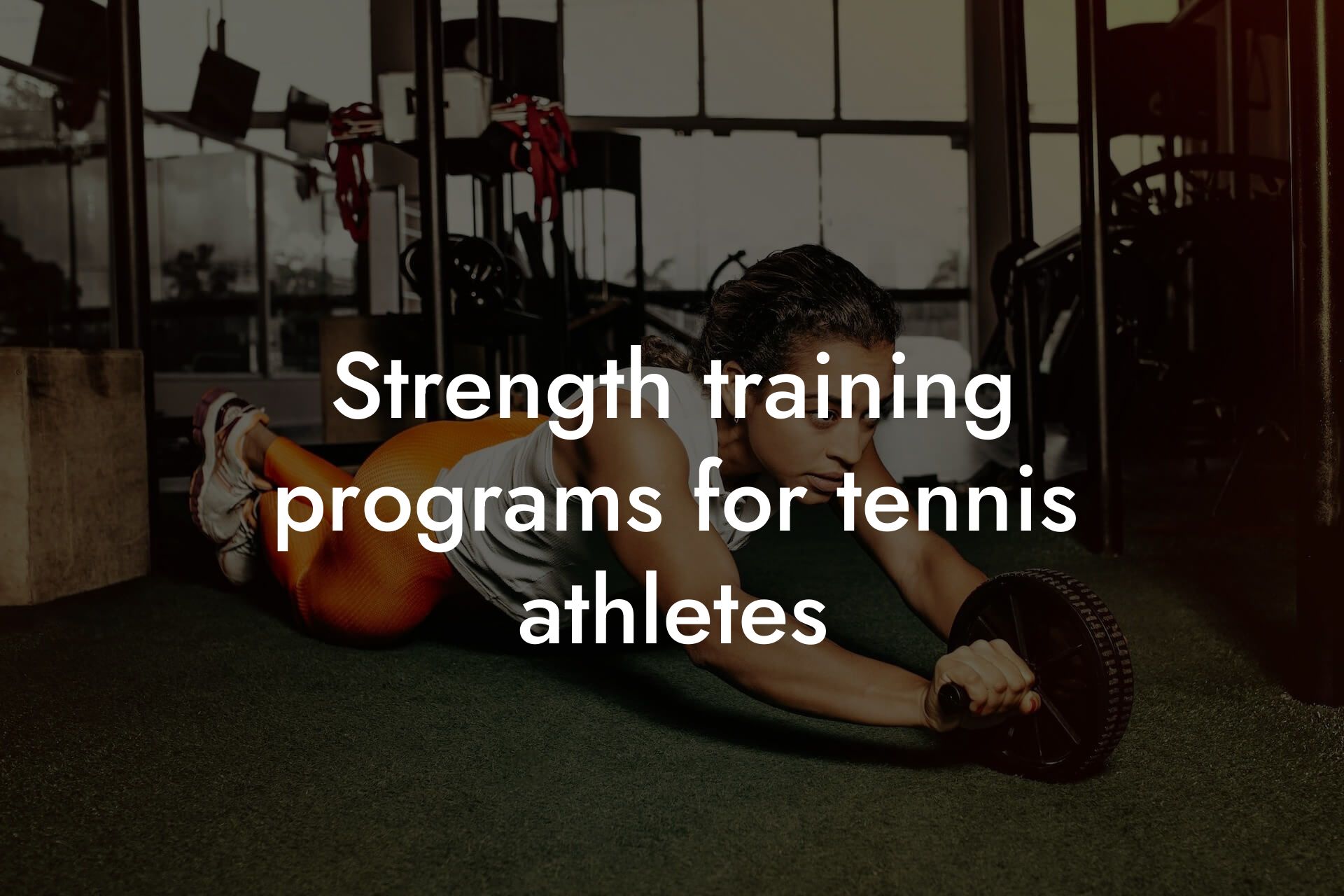As a high-earning professional, it's no secret that your work can be demanding, and finding time for fitness can be a challenge. However, neglecting your physical health can have serious consequences on your overall well-being and productivity. At Tano Performance Group, we understand the importance of balancing tech work and fitness, which is why we're committed to providing you with the tools and information you need to succeed. In this article, we'll explore the importance of balancing tech work and fitness, and provide you with actionable tips to help you achieve your goals.
Table of Contents
The Importance of Balancing Tech Work and Fitness
As a tech professional, you're likely no stranger to long hours spent sitting in front of a computer screen. While this may be necessary for your job, it can take a toll on your physical health. Prolonged periods of sitting have been linked to an increased risk of chronic diseases, such as heart disease, diabetes, and some types of cancer. Furthermore, a sedentary lifestyle can also affect your mental health, leading to anxiety, depression, and fatigue.
On the other hand, regular exercise can have numerous benefits for your physical and mental health. Exercise can help improve your cardiovascular health, increase your energy levels, and even boost your mood. Additionally, exercise can also improve your cognitive function, making you more productive and focused at work.
Understanding Your Body Composition
Before we dive into the tips for balancing tech work and fitness, it's essential to understand your body composition. At Tano Performance Group, we use DEXA machines to provide our clients with a complete body assessment. This includes measuring their body fat percentage, bone density, and lean muscle mass.
Understanding your body composition is crucial because it allows you to set realistic goals and track your progress. For example, if you have a high body fat percentage, you may need to focus on losing weight and building lean muscle mass. On the other hand, if you have low bone density, you may need to focus on exercises that improve your bone health.
Creating a Schedule That Works for You
One of the biggest challenges of balancing tech work and fitness is finding time to exercise. However, with a little creativity and planning, you can create a schedule that works for you. Here are a few tips to get you started:
Start by identifying your most productive hours of the day. Are you a morning person, or do you get more work done in the afternoon? Once you've identified your most productive hours, schedule your workouts around them. For example, if you're most productive in the morning, try scheduling your workouts in the evening.
Another tip is to break up your workouts into smaller sessions. Instead of trying to fit in a 60-minute workout session, try breaking it up into two 30-minute sessions. This can help you stay focused and avoid burnout.
Finding Exercises That You Enjoy
Exercise shouldn't be a chore. In fact, finding exercises that you enjoy can make it more likely that you'll stick to your fitness routine. Here are a few tips for finding exercises that you enjoy:
Try new things. Don't be afraid to try new exercises or workout classes. You might be surprised at what you enjoy.
Find a workout buddy. Having a workout buddy can make exercise more enjoyable and help you stay accountable.
Focus on functional exercises. Functional exercises, such as squats and lunges, can help improve your overall fitness and make daily activities easier.
Incorporating Strength Training into Your Routine
Strength training is an essential part of any fitness routine. Not only can it help improve your overall fitness, but it can also improve your bone density and reduce your risk of injury. Here are a few tips for incorporating strength training into your routine:
Start with compound exercises. Compound exercises, such as squats and deadlifts, work multiple muscle groups at once and can help you build lean muscle mass more efficiently.
Focus on progressive overload. Progressive overload involves gradually increasing the weight or resistance you're using over time. This can help you continue to challenge your muscles and avoid plateaus.
Incorporating Cardio into Your Routine
Cardio exercises, such as running or cycling, are essential for improving your cardiovascular health. Here are a few tips for incorporating cardio into your routine:
Start slow. If you're new to cardio, start with short sessions and gradually increase the duration and intensity over time.
Find a cardio exercise that you enjoy. Just like with strength training, finding a cardio exercise that you enjoy can make it more likely that you'll stick to your routine.
Staying Motivated
Staying motivated is essential for achieving your fitness goals. Here are a few tips for staying motivated:
Set realistic goals. Setting realistic goals can help you stay motivated and avoid burnout.
Track your progress. Tracking your progress can help you see how far you've come and stay motivated to continue.
Reward yourself. Rewarding yourself for reaching your goals can help you stay motivated and encouraged to continue.
Balancing tech work and fitness requires discipline, dedication, and a willingness to make changes. By understanding your body composition, creating a schedule that works for you, finding exercises that you enjoy, incorporating strength training and cardio into your routine, and staying motivated, you can achieve your fitness goals and improve your overall well-being. At Tano Performance Group, we're committed to providing you with the tools and information you need to succeed. Contact us today to learn more about our DEXA machine and how it can help you achieve your fitness goals.
Frequently Asked Questions
How do I find time to exercise when I have a demanding tech job?
As a high-earning professional, it's common to have a packed schedule. The key is to prioritize your fitness goals and schedule exercise sessions in your calendar, just as you would any other important meeting or deadline. Even 20-30 minutes of exercise per day can make a significant difference. Consider waking up earlier, taking a lunch break workout, or incorporating physical activity into your daily commute.
What are some exercises I can do at my desk to stay active?
There are several exercises you can do at your desk to stay active and reduce the risk of sedentary behavior. Try doing chair squats, desk push-ups, leg raises, or arm circles. You can also invest in a standing desk or a balance ball chair to encourage more movement throughout the day.
How can I stay motivated to exercise when I'm tired from work?
It's normal to feel tired after a long day of work, but it's essential to remember that exercise can actually increase energy levels and reduce fatigue. Find an exercise routine that you enjoy, whether it's running, yoga, or weightlifting, and schedule it in your calendar. Having a workout buddy or accountability partner can also help motivate you to show up and exercise, even when you're feeling tired.
What are some healthy snack options for tech professionals on-the-go?
As a busy tech professional, it's easy to rely on convenience foods or sugary snacks to get you through the day. However, these options can be detrimental to your health and fitness goals. Instead, opt for healthy snack options like nuts, fruits, carrot sticks with hummus, or energy bars made with wholesome ingredients.
How can I balance my work and fitness goals when I have a lot of travel?
Traveling for work can be challenging, but it doesn't have to derail your fitness goals. Research local gyms or fitness studios near your hotel, or pack a portable workout kit with resistance bands or a jump rope. You can also take advantage of in-room workouts or exercise videos online. Don't forget to stay hydrated and fuel your body with healthy foods, even when you're on the go.
What are some tips for getting enough sleep as a tech professional?
Sleep is essential for physical recovery and mental performance. Aim for 7-9 hours of sleep per night and establish a consistent bedtime routine to signal to your body that it's time to wind down. Avoid screens and electronic devices for at least an hour before bedtime, and create a sleep-conducive environment by keeping your bedroom cool, dark, and quiet.
How can I prioritize self-care when I have a demanding job?
Self-care is not a luxury, it's a necessity. Prioritize activities that bring you joy and relaxation, such as reading, meditation, or spending time with loved ones. Schedule self-care sessions in your calendar, just as you would any other important appointment. Remember, taking care of yourself is essential to maintaining your physical and mental well-being.
What are some common mistakes tech professionals make when it comes to fitness?
One common mistake tech professionals make is neglecting their physical health due to the demands of their job. Another mistake is trying to make drastic changes to their diet or exercise routine, which can lead to burnout or injury. Start with small, sustainable changes and focus on progress, not perfection.
How can I track my progress and stay accountable?
Tracking your progress and staying accountable is crucial to achieving your fitness goals. Use a fitness tracker or mobile app to monitor your workouts, nutrition, and sleep. Share your goals with a friend or accountability partner and schedule regular check-ins to track your progress.
What are some benefits of incorporating strength training into my workout routine?
Incorporating strength training into your workout routine can have numerous benefits, including increased bone density, improved body composition, and enhanced athletic performance. It can also reduce the risk of injury and improve overall physical function.
How can I avoid burnout and maintain a healthy work-life balance?
Avoiding burnout requires setting clear boundaries between your work and personal life. Establish a routine that allows for time off and relaxation, and prioritize activities that bring you joy and fulfillment. Learn to say no to non-essential tasks and delegate when possible.
What are some healthy meal prep options for busy tech professionals?
Meal prep can be a game-changer for busy tech professionals. Consider preparing healthy meals in bulk, such as salads, soups, or stir-fries, and portioning them out in containers for easy grab-and-go. You can also invest in a meal delivery service or prep healthy snacks like energy balls or trail mix.
How can I stay hydrated throughout the day?
Staying hydrated is essential for physical performance and mental focus. Aim to drink at least 8-10 glasses of water per day, and avoid sugary drinks or caffeine that can dehydrate you. Keep a water bottle with you throughout the day and take regular breaks to refill it.
What are some tips for reducing stress and anxiety as a tech professional?
Reducing stress and anxiety requires a holistic approach. Try incorporating stress-reducing activities like yoga, meditation, or deep breathing exercises into your daily routine. Prioritize sleep, exercise, and healthy nutrition, and take regular breaks to relax and recharge.
How can I make time for fitness when I have a family?
As a busy tech professional with a family, it can be challenging to find time for fitness. Consider incorporating physical activity into your daily routine, such as taking a family bike ride or playing a sport with your kids. You can also schedule workouts during naptime or after bedtime, or find a workout buddy who can watch your kids while you exercise.
What are some common injuries tech professionals are prone to?
Tech professionals are prone to injuries related to sedentary behavior, such as back pain, carpal tunnel syndrome, or eye strain. They may also be prone to overuse injuries, such as tendonitis or shin splints, if they're new to exercise or don't warm up properly.
How can I prevent overtraining and injury?
Preventing overtraining and injury requires listening to your body and not pushing yourself too hard. Start with moderate intensity and frequency, and gradually increase as your body adapts. Warm up properly before exercise, cool down afterwards, and take rest days as needed.
What are some benefits of working with a personal trainer or fitness coach?
Working with a personal trainer or fitness coach can provide accountability, motivation, and customized guidance tailored to your fitness goals and needs. They can help you develop a workout routine that's safe and effective, and provide support and encouragement along the way.
How can I stay motivated to reach my fitness goals?
Staying motivated requires setting clear and achievable goals, finding an exercise routine you enjoy, and celebrating small victories along the way. Share your goals with a friend or accountability partner, and reward yourself for milestones achieved.
What are some tips for getting started with a new exercise routine?
Getting started with a new exercise routine requires setting clear goals, finding an exercise routine you enjoy, and starting slowly. Begin with moderate intensity and frequency, and gradually increase as your body adapts. Don't be too hard on yourself if you miss a workout – simply get back on track and keep moving forward.
How can I track my nutrition and make healthy food choices?
Tracking your nutrition and making healthy food choices requires planning and preparation. Use a food diary or mobile app to track your daily food intake, and plan your meals in advance. Focus on whole, unprocessed foods like fruits, vegetables, lean proteins, and whole grains.
What are some benefits of incorporating flexibility and stretching into my workout routine?
Incorporating flexibility and stretching into your workout routine can improve range of motion, reduce injury risk, and enhance overall physical function. It can also reduce muscle tension and improve recovery time.
How can I make fitness a habit?
Making fitness a habit requires consistency and commitment. Schedule exercise sessions in your calendar, and treat them as non-negotiable appointments. Find an exercise routine you enjoy, and vary your routine to avoid boredom or plateaus.
Zak Faulkner
Zak Faulkner is a leading authority in the realm of physical health and body composition analysis, with over 15 years of experience helping professionals optimise their fitness and well-being. As one the experts behind Tano Performance Group, Zak has dedicated his career to providing in-depth, science-backed insights that empower clients to elevate their physical performance and overall health.
With extensive knowledge of DEXA technology, Zak specializes in delivering comprehensive body assessments that offer precise data on body fat, muscle mass, bone density, and overall physique. His expertise enables individuals to make informed decisions and achieve their fitness goals with accuracy and confidence. Zak’s approach is rooted in a deep understanding of human physiology, combined with a passion for helping clients unlock their full potential through personalised strategies.
Over the years, Zak has earned a reputation for his commitment to excellence, precision, and client-focused service. His guidance is trusted by top professionals who demand the best when it comes to their health. Whether advising on fitness programs, nutritional strategies, or long-term wellness plans, Zak Faulkner’s insights are a valuable resource for anyone serious about taking their health and fitness to the next level.
At Tano Performance Group, Zak continues to lead our Content Team revolutionising how professionals approach their physical health, offering unparalleled expertise that drives real results.




